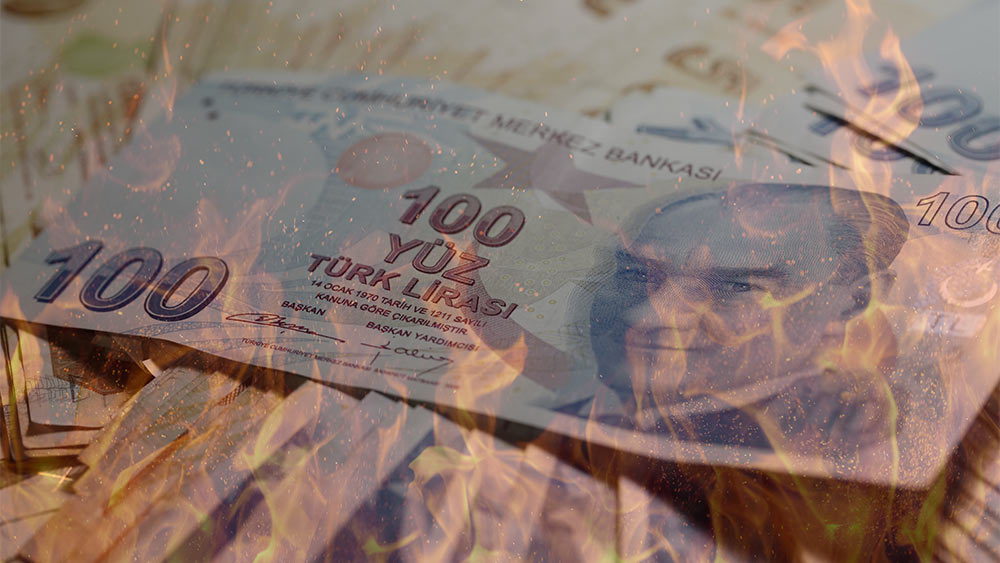
Source: Depositphotos | Author: DeltaStock
Reading time: 4 minutes
After previously crashing to a then unfathomable record low of 13.44 to the dollar in late November, yesterday the lira plunged to a new shocking low of 17.12 to the dollar after the country’s Central Bank voted to once again cut its interest rate from 15% to 14%.
For perspective, the average mid-2017 value was just 3.5 to the dollar, yet the lira has somehow managed to lose more than 40% of its value against the U.S. dollar this year alone!
How bad is Turkey’s current crisis?
At this point, analysts place their bets that this insane trend will continue in the foreseeable future, leading to spiking inflation and rising poverty levels all across the nation. In fact, the ongoing crisis there has already:
– Encouraged a wave of dollar hoarding
– Forced Turkey to dip into its precious foreign exchange reserves for the first time in nearly 8 years in order to sell U.S. dollars and keep the lira afloat
– Incited nationwide protests as people grew tired of the government’s poor economic judgement and the roaring inflation of nearly 20% that’s been dwindling their savings
But why has the government allowed for this to happen in the first place?
A president-controlled monetary policy
The answer is as simple as it is terrifying – because the president said so. In the mind of Turkish President Recep Tayyip Erdogan, by progressively cutting the interest rate he is waging an “economic war of independence” that will fight inflation, boost economic growth, strengthen exports, create new jobs and ultimately free his nation from its heavy dependence on foreign investments. In fact, he is so confident in his “unorthodox” theory, that he fired three central bank chiefs in roughly two years over policy differences.
If you look at the data, you may agree with him at first as Turkey’s economy did grow 7.4% in the third quarter compared with a year earlier. Yet not only did the living standards for the Turks not improve but they became even worse due to soaring inflation. Among the reasons are:
– Turkish businesses that depend on imported goods are facing higher costs because the lira is packing far less purchasing power punch
– These higher costs are then passed onto the consumer, which has resulted in outrageous prices for even the most basic necessities, like food and energy
– Turkey’s economy is also very dependent on external financing, which means that businesses that took out debts denominated in dollars are facing steeper repayment costs as the lira loses value against the greenback
Erdogan – the sole person responsible for the crisis?
To be fair, Turkey’s currency has been in a downward slide since early 2018, thanks to a combination of geopolitical tensions with the West, current account deficits, shrinking currency reserves, and mounting debt. However, Erdogan’s stubborn refusal to raise interest rates, coupled with a worldwide shortage crisis caused by a still ongoing global pandemic, has made things a lot worse.
And now, as inflation takes hold of developed markets as well (over 6% in the U.S. and over 4% in the EU), the U.S. Federal Reserve was forced to finally unwind its easy-money policies, thus further strengthening the U.S. dollar against the lira.
What comes next?
As we have seen from the pandemic, all central banks have been politicised in one form or another, which has ultimately eroded the savings and purchasing power of the very people they are trying to protect. In fact, chief financial analyst of DeltaStock Ivaylo Chaushev believes that when the central banks do finally decide to intervene and take appropriate actions, which he expects to happen at around March – June next year, the situation will already be quite dire.
The current unfortunate situation in Turkey is a cautionary tale of what happens when politics, rather than sound economic fundamentals, are allowed to be the driving force of a central bank’s monetary policy. But that doesn’t mean that other nations can’t follow its path if they too become reckless in the financial department.
The silver lining from all of this, perhaps, is that the Turkish lira fiasco is a very good showcase of how inflation could go out of control when the tools of monetary policy are not used properly, so hopefully, central bankers everywhere are taking notes.
***
Trade over 70 forex pairs in a real market environment and without any risk of losing real funds with a demo account in Delta Trading.